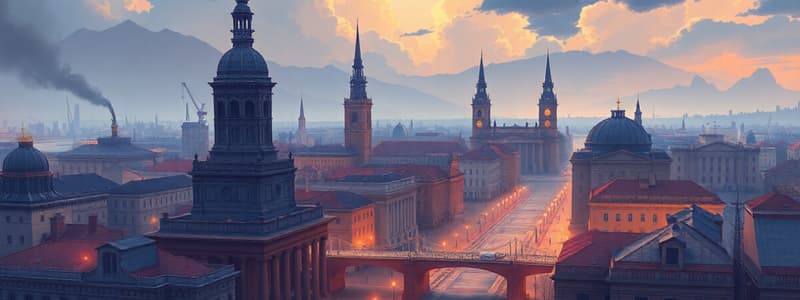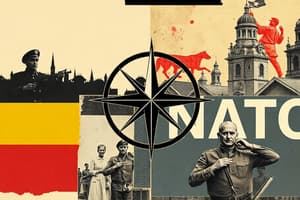Podcast
Questions and Answers
Which event marked the beginning of the Federal Republic of Germany's (FRG) independent presence in international relations?
Which event marked the beginning of the Federal Republic of Germany's (FRG) independent presence in international relations?
- The creation of the Ministry of Foreign Affairs.
- Becoming a member of NATO.
- Inclusion in the Marshall Plan. (correct)
- The abolition of the state of war status.
What was the significance of the year 1952 for the Federal Republic of Germany (FRG)?
What was the significance of the year 1952 for the Federal Republic of Germany (FRG)?
- The FRG was included in the Marshall Plan.
- The FRG became a member of the Council of Europe.
- The Ministry of Foreign Affairs was created which lead to its independent presence in international relations.
- The occupation regime fell and Allied military control was abolished. (correct)
What was the most important transformation of the FRG (West Germany) after becoming a member of NATO?
What was the most important transformation of the FRG (West Germany) after becoming a member of NATO?
- Transformed into one of the most important European countries. (correct)
- Was formally recognized as an independent country.
- Became a leading force in international diplomacy.
- Was a member of the Council of Europe.
Which sequence of events accurately describes the FRG's (West Germany) path to re-establishment after the war?
Which sequence of events accurately describes the FRG's (West Germany) path to re-establishment after the war?
What can you infer about the political conditions in Germany immediately before the FRG became a member of NATO?
What can you infer about the political conditions in Germany immediately before the FRG became a member of NATO?
How did the Marshall Plan primarily contribute to the recovery of the Federal Republic of Germany (FRG) after World War II?
How did the Marshall Plan primarily contribute to the recovery of the Federal Republic of Germany (FRG) after World War II?
What was the primary consequence of the Yalta decisions regarding Germany after World War II?
What was the primary consequence of the Yalta decisions regarding Germany after World War II?
What was the main focus of the new political forces emerging in West Germany during 1947-1948?
What was the main focus of the new political forces emerging in West Germany during 1947-1948?
Which factor most directly facilitated political stability alongside rapid economic development in the Federal Republic of Germany (FRG)?
Which factor most directly facilitated political stability alongside rapid economic development in the Federal Republic of Germany (FRG)?
What key characteristics defined the economic policy adopted by the Federal Republic of Germany (FRG) during its period of rapid development?
What key characteristics defined the economic policy adopted by the Federal Republic of Germany (FRG) during its period of rapid development?
What was the significance of the union between the territories controlled by the USA, England, and France in post-war Germany?
What was the significance of the union between the territories controlled by the USA, England, and France in post-war Germany?
Besides the USA, which countries administered parts of post-war Germany according to the Yalta decisions?
Besides the USA, which countries administered parts of post-war Germany according to the Yalta decisions?
How did the establishment of the German Democratic Republic (GDR) in the southeast of Germany impact the country's political landscape?
How did the establishment of the German Democratic Republic (GDR) in the southeast of Germany impact the country's political landscape?
What role did the German people play in the rapid economic development of the Federal Republic of Germany (FRG)?
What role did the German people play in the rapid economic development of the Federal Republic of Germany (FRG)?
What international organizations did the Federal Republic of Germany (FRG) join, signaling its emergence from isolation after World War II?
What international organizations did the Federal Republic of Germany (FRG) join, signaling its emergence from isolation after World War II?
Flashcards
FRG International Presence
FRG International Presence
After 1949, the FRG gained global recognition and involvement in international affairs.
End of Allied Occupation
End of Allied Occupation
In 1952, the Allied occupation regime ended, giving Germany more control.
FRG Joins NATO
FRG Joins NATO
In 1955, the FRG joined NATO, marking its return as a major European power.
1947 Significance
1947 Significance
Signup and view all the flashcards
Marshall Plan and FRG
Marshall Plan and FRG
Signup and view all the flashcards
Post-War Germany Unification
Post-War Germany Unification
Signup and view all the flashcards
Federal Republic of Germany (FRG)
Federal Republic of Germany (FRG)
Signup and view all the flashcards
FRG's Economic Recovery
FRG's Economic Recovery
Signup and view all the flashcards
"Economic Miracle"
"Economic Miracle"
Signup and view all the flashcards
Post-War Division of Germany
Post-War Division of Germany
Signup and view all the flashcards
German Democratic Republic (GDR)
German Democratic Republic (GDR)
Signup and view all the flashcards
Divided Germany
Divided Germany
Signup and view all the flashcards
New Political Forces in West Germany
New Political Forces in West Germany
Signup and view all the flashcards
CDU and SPD
CDU and SPD
Signup and view all the flashcards
Marshall Plan
Marshall Plan
Signup and view all the flashcards
Study Notes
- From 1947–1949 the unification of the German sections took place, under the occupation of the Americans, English, and French.
- The Federal Republic of Germany (FRG), democratic reforms, and the Marshall Plan contributed to the rapid development of the economy.
- From the 1950s to the 1960s, was a period known as the "economic miracle."
- The FRG became second in the global market, was admitted to Council of Europe and NATO and emerged from isolation.
Post-War Germany
- Germany's state immediately after the war was difficult, and securing housing and food were the main problems.
- Germany was divided into four sections and administered by the victorious powers: the USA, England, the Soviet Union and France.
- In January 1947, the sections under US and British control merged.
- The unification of these sections was marked in 1949 by the establishment of the Federal Republic of Germany (FRG).
- In the eastern part, under the occupation of Soviet troops, the German Democratic Republic (GDR) was formed.
- Germany was divided into two states (democratic and communist), with two capitals (Bonn and Berlin), two constitutions and two currencies.
- This situation lasted about 40 years.
- The new political forces in West Germany were disoriented and unorganized.
- Initially focused on consolidating democratic institutions and eliminating the consequences of Nazism.
- The main parties in Germany were Christian Democratic Union (CDU) and the Social Democratic Party.
Rapid Economic Growth in Germany
- The FRG formed a central government to create a plan for the economic development of the country.
- Remarkable labor discipline and dedication were committed to the elimination of difficulties.
- The USA, with the Marshall Plan, provided great financial support.
- Proper utilization of funding created the conditions for rapid development in Germany.
- Unemployment decreased and normal trade movements happened
- The decade of the 50s was characterized as the "economic miracle".
- The economic development of D. The FRG continued rapidly and during the decade of the 60's.
- In a short time, the FRG became the second in the global market. The creation of many jobs was prioritized in the development of the free market, while the intervention of the state was limited only to necessary cases.
- The rapid economic development of Germany contributed to domestic political stability.
Germany: a Free and Democratic State
- When Germany was governed by the victorious countries, it was not considered an independent country internationally.
- D. would offer an independent presence on the international scene after 1949, when it was included in the Marshall Plan.
- In 1951 it became a member of the Council of Europe and the Ministry of Foreign Affairs officially removed the state of war with the Western allies.
- The Government and the Federal Democratic Republic considered its representatives in third countries.
- In 1952 the occupying regime and military control of the allies were abolished.
- In 1955 the FRG became a member of NATO and thus turned back into one of the major European countries.
Studying That Suits You
Use AI to generate personalized quizzes and flashcards to suit your learning preferences.




